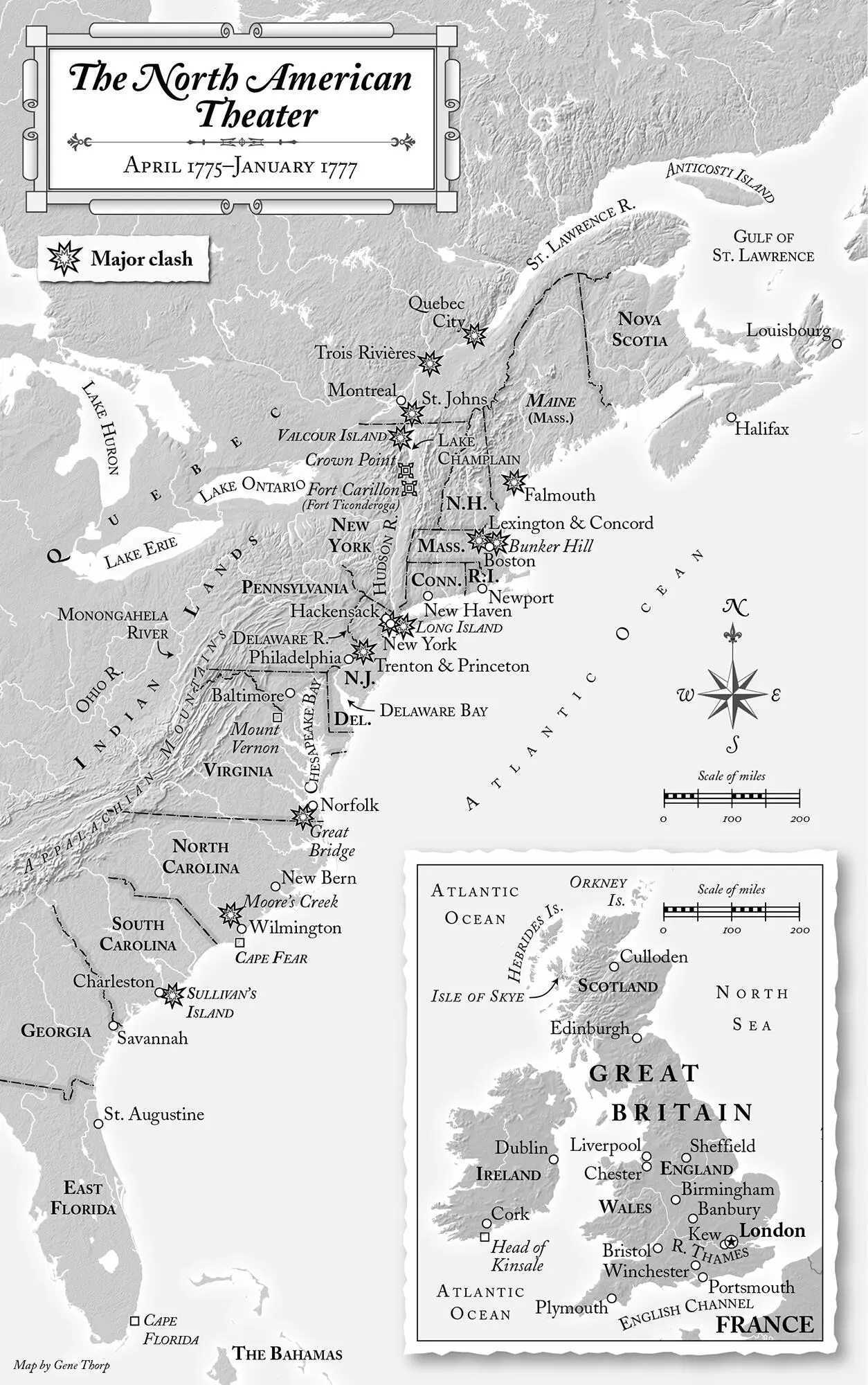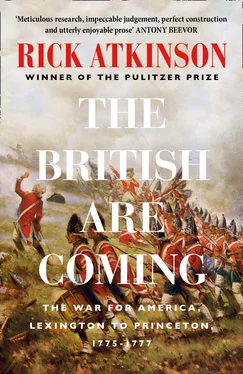His good friend Priestley, beak-nosed and thin-lipped, offered a sympathetic ear. As librarian and companion to the Earl of Shelburne, Priestley lived in the earl’s sprawling mansion just off Berkeley Square. The son of a Calvinist cloth dresser, he, too, was a universal genius, one who, it was said, wrote books faster than people could read them. The previous August he had discovered the gas called oxygen, and he would be credited with identifying nitrogen, ammonia, carbon monoxide, and other gases, as well as photosynthesis, the principles of combustion, and the recipe for soda water. On this Monday he and Franklin pondered electricity and sundry scientific mysteries, as they had for years. Then the conversation turned to politics and what Franklin called “the impending calamities.” “Much of the time was employed in reading American newspapers,” Priestley later wrote of that day with Franklin, “especially accounts of the reception which the Boston Port Bill met with in America. And as he read … the tears trickled down his cheeks.” The coming war would likely last ten years, Franklin predicted, and he would “not live to see the end of it.”
He wept, not least, for his own shortcomings. For decades he had championed a greater Great Britain, an Anglo-American union of “mutual strength and mutual advantage.” As political upheaval strained those blood ties, he sought “to palliate matters” with various compromises, including an offer to pay for Boston’s drowned tea from his own pocket. Even now he considered the schism to be “a matter of punctilio, which two or three reasonable people might settle in half an hour.” But by degree he had grown vexed, then angry at what he called the “insolence, contempt, and abuse” of arrogant British officials toward his countrymen; the condescending reference to Americans as “foreigners” infuriated him. His writings turned acerbic: he proposed to answer the British practice of shipping convicts to America by exporting rattlesnakes to England, and his Swiftian essay, “Rules by Which a Great Empire May Be Reduced to a Small One,” postulated that “a great empire, like a great cake, is most easily diminished at the edge.”
Then, two years ago, disaster had struck when a wise man did a foolish thing. Someone whose identity remained obscure gave Franklin a sheaf of private letters written by a Crown official in Massachusetts to a British undersecretary, urging stern measures by the government against New England troublemakers. One passage even advocated “an abridgement of what are called English liberties.” In December 1772, Franklin sent the letters to Boston as confidential intelligence for patriot leaders, but six months later they were published, causing an uproar in New England, and then in Britain. Franklin eventually placed a notice in the London Chronicle , disclosing his responsibility. British newspapers vilified him as “this old snake,” “old Doubleface,” and a “base, ungrateful, cunning, upstart thing.”
On January 29, 1774, he appeared before the king’s council in the Cockpit, a Whitehall amphitheater once used for cockfights. For more than an hour, Franklin was pelted with invective, denounced as a “man without honor” and a “hoary-headed traitor” who had “forfeited all the respect of societies and men.” The packed gallery jeered while he stood as still as statuary, wearing a fine blue suit of spotted Manchester velvet. It was the greatest humiliation of his life, and a day later he was sacked as deputy postmaster general for North America. He had made a serious error of judgment, but so had Britain, by demeaning the Crown’s best American ally in promoting imperial harmony.
In the months since that wretched day, he had shrugged off the ordeal to continue mediating between Crown and colonies. He took meetings, public and private, enduring endless palaver with men of influence and no influence, men of goodwill and ill will, men with potential remedies and men spouting nonsense. Franklin admitted to growing “irritated and heated”; he insisted on repealing the Coercive Acts, withdrawing the fleet from Boston, and removing British soldiers to Quebec or Florida. “The true art of governing the colonies,” he believed, “lies in … only letting them alone.” The government secretly intercepted and read his mail, carefully repairing the seals and making copies with a cover note that labeled him “this arch traitor.” Public hopes for reconciliation ascended, then subsided, only to rise again. The stock market jumped in late December on false news that he and Lord North had reached a peace deal.
But there would be no peace. These febrile efforts, he wrote, “availed no more than the whistling of the winds.” While government officials considered him the “great director” of New England radicals, the radicals themselves wondered if he was “too much of an Englishman.” He felt “like a thing out of its place, and useless because it is out of its place.” Like many Americans, he found that the middle ground was narrow and perilous; he, too, gradually chose insurrection. Britain, he concluded, had become “this old rotten state.” He was reduced to quoting from Horace’s Odes : “What is bad now may not always be.”
Franklin spent his final night on Craven Street. The last of his books, papers, and scientific instruments packed, he caught the post coach for Portsmouth on March 21. Beyond the political turmoil, two personal matters gnawed at him as he rolled through Surrey on a route similar to that taken by the king to the dockyards twenty-one months earlier. In New Jersey, Governor William Franklin, the great man’s son, seemed intent on remaining loyal to the Crown. “You, who are a thorough courtier,” Franklin wrote in a letter, “see everything with government eyes.” And in Philadelphia, his common-law wife of forty-four years, Deborah, had died in December after a long decline. Although a faithful correspondent, Franklin had not seen her in a decade. Regret and perhaps guilt dogged him up the gangplank onto the Pennsylvania Packet , moored along the Portsmouth waterfront.
Franklin never went to sea without vowing never to go again. Yet here he was in his seventieth year, a large man in a small cabin on a small ship. He had resolved to stay busy during the passage, scrutinizing the heavens with his telescope and frequently measuring ocean temperatures with a thermometer suspended on a long rope, as part of his perpetual study of the Gulf Stream. He promptly started a letter to William, which began, “Dear Son” and grew to twenty thousand words on 250 foolscap pages, as it became a detailed account of his failed diplomacy in Britain. That failure had taught him lessons in patience, tact, intrigue, and power—lessons that would prove useful, since his best days as a diplomat, perhaps the greatest America ever produced, still lay ahead of him.
The bells of Philadelphia would ring for joy upon his arrival six weeks hence. The man who had felt “like a thing out of place” would find his rightful place. Among the slurs hurled at him in the Cockpit was the accusation of being a “true incendiary.” That much was certain, as befitted the American Prometheus. He was the best of his breed, this kite flier, this almanac maker, this lightning tamer. The Pennsylvania Packet shrugged off her moorings and crowded on sail, bearing him home, where he belonged.

Part One
1.
God Himself Our Captain
BOSTON, MARCH 6—APRIL 17, 1775
The mildest winter in living memory had yielded to an early spring. Not once had the Charles River iced over, and even now whispers of green could be seen on the Common sward and across the tumbling hills to the north. By reducing the need for firewood, this “extraordinary weather for warlike preparations,” as one pugnacious clergyman called it, had preserved Boston from even greater suffering in the nine months since British warships had closed the port. Still, warehouses stood vacant, shipyards idle, wharves deserted, shop shelves barren. The only topsail vessels in view were the eight Royal Navy men-of-war plugging the harbor approaches. “It is now a very gloomy place, the streets almost empty,” a woman wrote an English friend in early March 1775. “Many families have removed from it, & the inhabitants are divided.… Some appear desponding, others full of rage.”
Читать дальше













